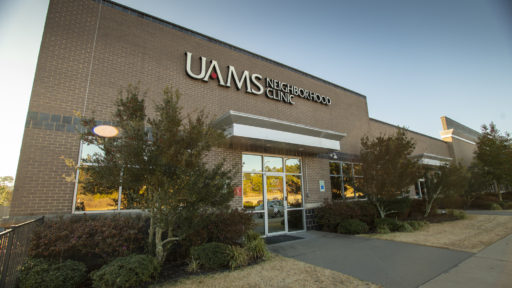Locations
Search Locations
Filters
List of Locations

Adult Genetics Clinic — Northwest (Part of Family Medical Center in Fayetteville)
1125 N. College Ave.
UAMS Northwest Regional Campus
Fayetteville, AR 72703
- Appointment Phone Number
- 501-526-4020
New and Returning Patients

Adult Genetics Clinic on Rahling Road (Part of Neighborhood Clinic on Rahling Road)
1811 Rahling Road
Suite 120
Little Rock, AR 72223
- Appointment Phone Number
- 501-526-4020
New and Returning Patients

Aesthetic Plastic Surgery Clinic
9501 Baptist Health Drive
Medical Towers II
Suite 760
Little Rock, AR 72205
- Appointment Phone Numbers
- 501-526-7115
New Patients - 501-219-1970
Returning Patients

Allergy and Immunology Clinic
4110 Outpatient Circle
Outpatient Center
Little Rock, AR 72205
- Appointment Phone Numbers
- 501-526-1020
New Patients - 501-614-2948
Returning Patients

Aortic Center (Part of Surgery Clinic)
4110 Outpatient Circle
Outpatient Center
Little Rock, AR 72205
- Appointment Phone Number
- 501-686-6176
New and Returning Patients

Arkansas Children’s Hospital
1 Children's Way
Little Rock, AR 72202
- Appointment Phone Numbers
- 501-263-2644
Primary Care - 501-222-4596
Specialty Care

Arkansas Children’s Northwest
2601 Gene George Blvd.
Springdale, AR 72762
- Appointment Phone Number
- 479-334-3485
New and Returning Patients

Audiology Clinic (Part of Ear, Nose and Throat (ENT) Clinic in Little Rock)
501 Jack Stephens Drive
UAMS Jackson T. Stephens Spine and Neuroscience Institute
Little Rock, AR 72205
- Appointment Phone Number
- 501-686-5878
New and Returning Patients

Back and Neck Clinic (Part of Orthopaedic Clinic on Colonel Glenn)
10815 Colonel Glenn Road
Suite 500
Little Rock, AR 72204
- Appointment Phone Number
- 501-686-5270
New and Returning Patients

Behavioral Medicine Clinic
449 Jack Stephens Drive
UAMS Winthrop P. Rockefeller Cancer Institute
Little Rock, AR 72205
- Appointment Phone Numbers
- 501-686-8700
New Patients - 501-686-8700
Returning Patients

Bone Marrow Procurement Clinic
449 Jack Stephens
UAMS Winthrop P. Rockefeller Cancer Institute
Little Rock, AR 72205
- Appointment Phone Number
- 501-686-7027
New and Returning Patients

Breast Center
449 Jack Stephens Drive
UAMS Winthrop P. Rockefeller Cancer Institute
Little Rock, AR 72205
- Appointment Phone Number
- 501-526-6100
New and Returning Patients
